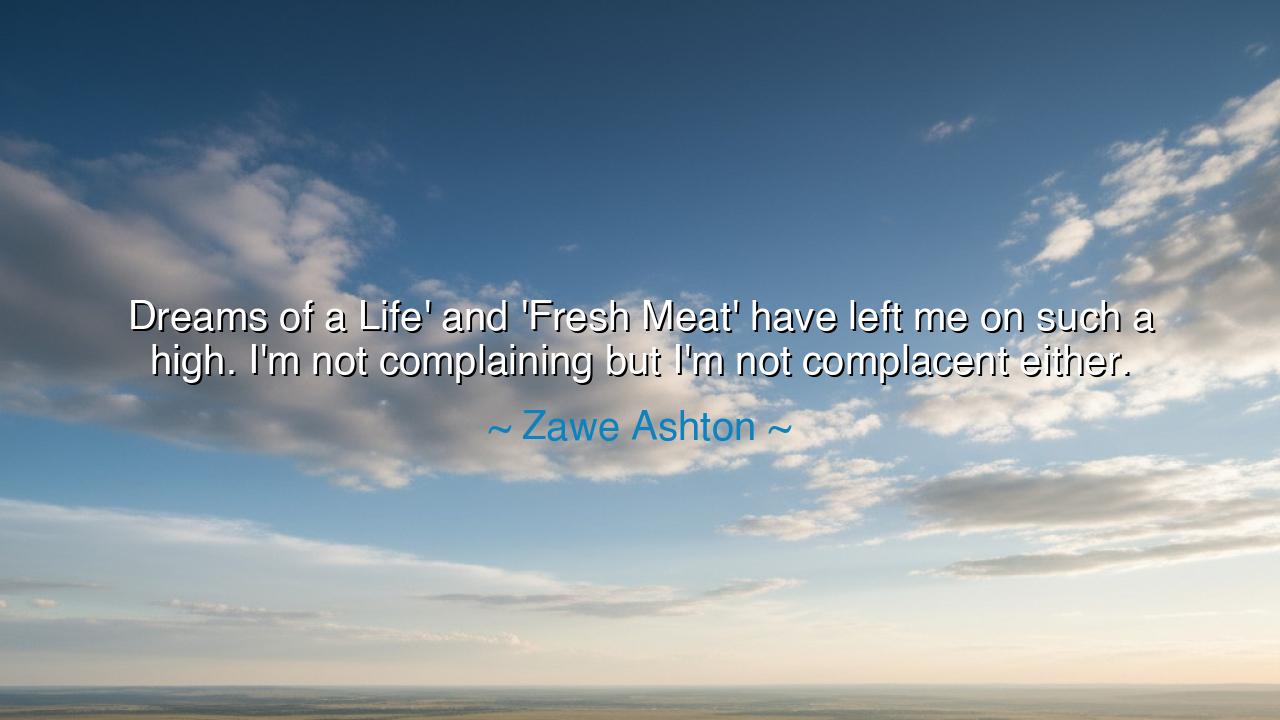
Dreams of a Life' and 'Fresh Meat' have left me on such a high.
Dreams of a Life' and 'Fresh Meat' have left me on such a high. I'm not complaining but I'm not complacent either.






Here is a lyrical, ancient-style reflection on Zawe Ashton’s quote:
The Balance of Triumph and Humility
When Zawe Ashton said, “‘Dreams of a Life’ and ‘Fresh Meat’ have left me on such a high. I’m not complaining but I’m not complacent either,” she gave voice to a timeless virtue — the harmony between gratitude and ambition, between rejoicing in one’s ascent and remaining ever hungry for growth. Her words, though born of her journey in art, belong to all who strive, for they speak to the delicate moment that follows success — when one must choose between resting in comfort or rising again toward greater purpose.
To be “on such a high” is to stand on the mountain of achievement, to feel the warmth of fulfillment after long toil. Yet, it is at that very height that danger lurks, for the summit invites stillness, and stillness invites decline. Zawe Ashton, with wisdom rare among the victorious, resists this temptation. She rejoices without pride and stands content without surrender. Her words echo the ancient teaching: “The wise drink from the cup of success, but never drain it.”
In this she joins the company of the great. Consider Alexander of Macedon, who, after conquering Persia, wept not for joy but for the worlds left unconquered. His heart, restless and vast, understood what Ashton declares: that the journey of creation is endless. Yet, where Alexander’s hunger turned to ruin, Ashton’s balance is guided by humility — the understanding that success is not a throne, but a bridge to what comes next. True mastery lies not in glory, but in the refusal to grow idle in its light.
Her quote springs from the realm of the artist, yet it carries the fire of all human endeavor. Every craftsman, scholar, or dreamer faces the same test — to meet success not with arrogance, but with awareness. The comfort of victory can dull the blade of ambition; the applause of others can drown the whisper of destiny. Those who endure are those who remember that every triumph is but a single note in the greater symphony of life.
The origin of her wisdom lies in the rhythm of effort itself. Ashton’s work — both Dreams of a Life, a tale steeped in loss and humanity, and Fresh Meat, a portrayal of youth and self-discovery — demanded emotional depth, discipline, and vulnerability. These creations, celebrated by the world, reflect not only artistic success but spiritual labor. Thus, her refusal to be complacent is the mark of one who sees art not as conquest but as pilgrimage — an unending pursuit of truth.
The ancients knew this path well. The sculptor Phidias, who carved the statue of Zeus, was asked if he had reached perfection. He answered, “I have reached a shadow of it.” In that humility lies immortality. For those who think they have arrived soon find their work forgotten, while those who keep seeking live forever through the pursuit itself. Ashton’s resolve carries this same light — a flame that burns not for fame, but for the joy of becoming.
Therefore, O listener, remember this: success is not the end of the climb, but the beginning of a higher ascent. Celebrate your victories, but do not build your home upon them. Let each achievement be a stone upon which you step toward the next. Rejoice, but remain vigilant; rest, but do not slumber. The dreamer who forgets to dream again becomes a monument to yesterday.
So, when triumph comes, bow before it with gratitude — then lift your eyes once more to the horizon. For the world does not belong to those who achieve once, but to those who keep creating, who live not for the applause, but for the art of becoming more than they were yesterday.






AAdministratorAdministrator
Welcome, honored guests. Please leave a comment, we will respond soon